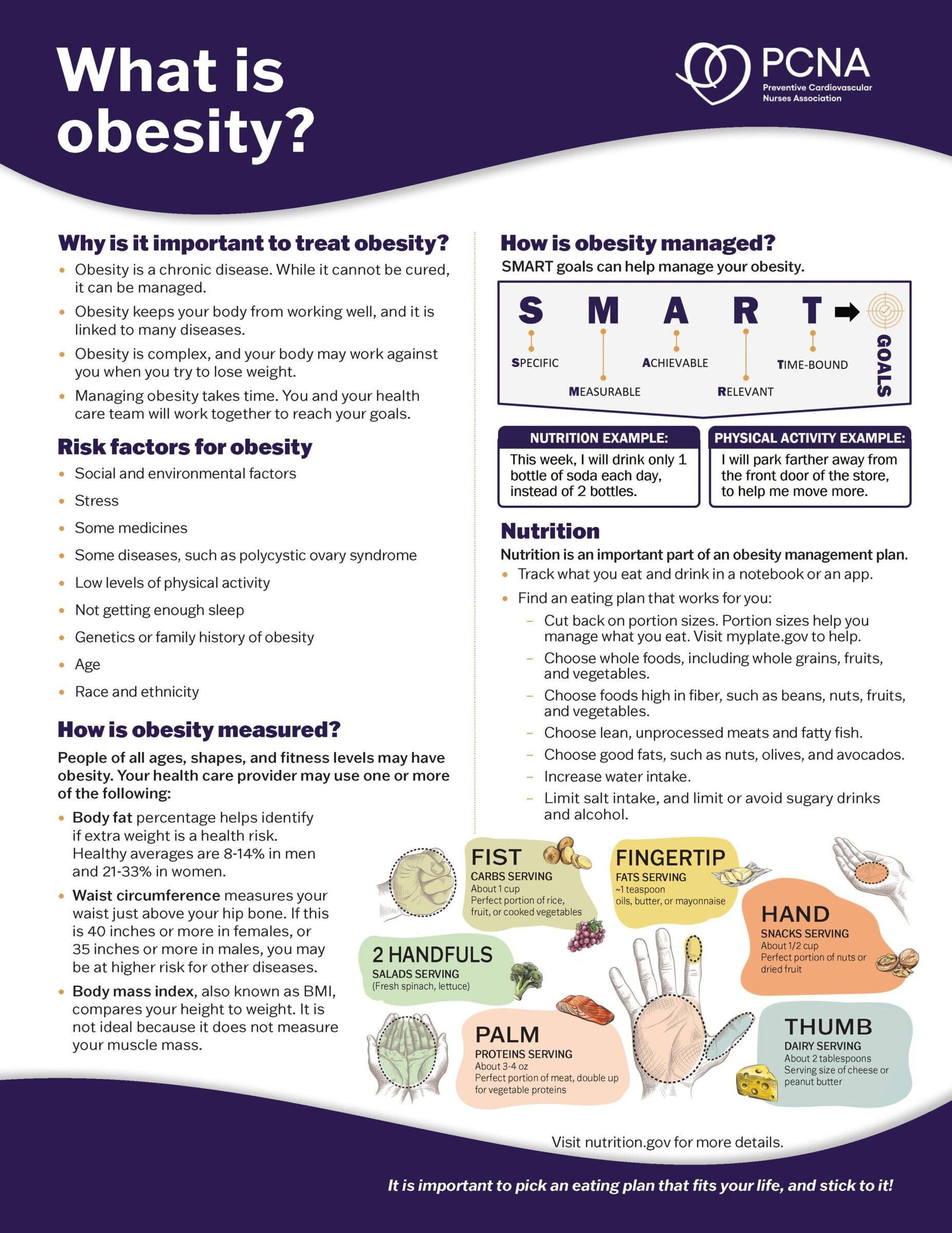Thank you to Nicole Crossley, RN, BSN, RDN, LD and Emily Jones, PhD, RNC-OB, FAHA, FPCNA for this article on maternal obesity and cardiovascular health.
Cardiovascular Maternal Health
Cardiovascular disease (CVD) is the leading cause of mortality in women.1 This trend is also seen in women of childbearing age, in whom cardiovascular-related causes have become the number one cause of maternal mortality, or pregnancy-related death.2 Higher rates of cardiovascular pregnancy-related mortality have been noted among non-Hispanic black and non-Hispanic American Indian/Alaska Native (AI/AN) women.3 Additionally, a woman’s cardiometabolic risk is impacted by unintended complications during pregnancy, also known as maternal morbidity.4,5 Women who experience pregnancy complications such as gestational diabetes (GDM), preeclampsia, gestational hypertension, preterm birth, having a small-for-gestational-age infant, or placental abruption have been identified as having a greater risk for continued metabolic disease risk and development throughout the lifespan.6-8

The Role of Maternal Obesity and Postpartum Weight Retention
Both maternal mortality and morbidity have been linked with maternal obesity9 and increased risk of pregnancy-related disorders including GDM, gestational hypertension, and preeclampsia.10,11 Increasing obesity rates are also evident in persons of reproductive age, with approximately 27.1% of women reporting their body mass index (BMI) as greater than or equal to 30 kg/m2.12 Hispanic women, along with non-Hispanic black and American Indian and Alaska Native women, face the highest rates of maternal obesity.13 Studies suggest that obesity in adulthood is linked to structural root causes including exposure to unpredictable environments and lower socioeconomic status during childhood.14
Maternal obesity may affect women at any and all time points of pregnancy: prior to pregnancy, during pregnancy, and after pregnancy. During the postpartum period following pregnancy, women may not return to their pre-pregnancy weight, leading to postpartum weight retention. Postpartum weight retention is defined as the difference between weight measured up to one year after delivery and weight prior to conception.15 Further, postpartum weight retention contributes to maternal obesity, which may affect future pregnancies by increasing the risk of pregnancy-related complications such as GDM, hypertensive disorders of pregnancy, cesarean delivery, delivery of a large-for-gestational-age infant, and premature birth.16,17
Postpartum Weight Retention, Stress, and Eating Behaviors
Many factors related to the transition to motherhood have been associated with postpartum weight retention, including decreased physical activity, increased nutritional intake, lack of social support, depression, and stress.15,18,19 Of these factors, stress and eating behaviors during the postpartum period may be variables of interest regarding weight retention. When caring for an infant, new parents may experience novel or increased stress, which has been associated with heightened cardiometabolic disease risk alone.20,21 Stress may also impact the consumption of nutrient-dense foods that are often high in sugar and fat, leading to increased weight. 22 Women have also reported eating as a way to decrease stress.18
Eating behaviors may reflect underlying situations and circumstances that contribute to eating.23 One distinct eating behavior, disinhibited eating, embodies overeating when around palatable foods or when experiencing negative emotions.24 Disinhibited eating has been associated with obesity in adults25, as well as both increased BMI and body fat percentage in young women.26 A recent systematic review examined 20 articles that addressed peripartum weight changes, including postpartum weight retention, and different eating behaviors.23 The findings were contradictory; however, some studies indicated that certain eating behaviors, including intuitive eating and restrained eating, were associated with postpartum weight retention. Due to the limited evidence available for the review, the authors suggest more robust studies should be done to further examine eating behaviors in the postpartum period to potentially decrease postpartum weight retention and improve cardiometabolic health for future pregnancies and throughout the life course.
Clinical Takeaways for Cardiovascular Nurses
Women’s health during pregnancy and the childbearing year is linked to future CVD risk. Cardiovascular nurses can recognize that mothers may be at a higher risk for cardiovascular-related health problems, particularly if they have experienced certain morbidities during pregnancy or have an increased BMI. Additionally, stress has been directly correlated with cardiometabolic risk and cardiovascular health but may also impact eating behaviors that affect postpartum weight retention. To improve maternal health equity, we need multi-level approaches to optimize perinatal-life course care and promote practice and policies that address social and structural determinants of health and promote lifestyle modifications to combat obesity.27 Through these actions, nurses and nurse scientists can contribute to improved cardiovascular health for women across the life course.
Related Maternal Obesity and Health Resources
- Call to Action: Cardiovascular-Realted Maternal Mortality
- 2022 Cardiovascular Nursing Symposium session on Friday, March 25 titled Maternal Mortality, Cardiovascular Disease and Prevention
References
- Benjamin EJ, Muntner P, Alonso A, et al. Heart Disease and Stroke Statistics-2019 Update: A Report From the American Heart Association [published correction appears in Circulation. 2020 Jan 14;141(2):e33]. Circulation. 2019;139(10):e56-e528. doi:10.1161/CIR.0000000000000659
- CDC. Pregnancy Mortality Surveillance System: Centers for Disease Control and Prevention; 2020 [cited 2021 October 11].
- Petersen EE, Davis NL, Goodman D, et al. Racial/Ethnic Disparities in Pregnancy-Related Deaths – United States, 2007-2016. MMWR Morb Mortal Wkly Rep. 2019;68(35):762-765. Published 2019 Sep 6. doi:10.15585/mmwr.mm6835a3
- American College of Obstetricians and Gynecologists and the Society for Maternal–Fetal Medicine, Kilpatrick SK, Ecker JL. Severe maternal morbidity: screening and review. Am J Obstet Gynecol. 2016;215(3):B17-B22. doi:10.1016/j.ajog.2016.07.050
- Rich-Edwards JW, Fraser A, Lawlor DA, Catov JM. Pregnancy characteristics and women’s future cardiovascular health: an underused opportunity to improve women’s health?. Epidemiol Rev. 2014;36(1):57-70. doi:10.1093/epirev/mxt006
- Cusimano MC, Pudwell J, Roddy M, Cho CK, Smith GN. The maternal health clinic: an initiative for cardiovascular risk identification in women with pregnancy-related complications. Am J Obstet Gynecol. 2014;210(5):438.e1-438.e4389. doi:10.1016/j.ajog.2013.12.001
- Fraser A, Nelson SM, Macdonald-Wallis C, et al. Associations of pregnancy complications with calculated cardiovascular disease risk and cardiovascular risk factors in middle age: the Avon Longitudinal Study of Parents and Children. Circulation. 2012;125(11):1367-1380. doi:10.1161/CIRCULATIONAHA.111.044784
- Hauspurg A, Ying W, Hubel CA, Michos ED, Ouyang P. Adverse pregnancy outcomes and future maternal cardiovascular disease. Clin Cardiol. 2018;41(2):239-246. doi:10.1002/clc.22887
- American College of Obstetricians and Gynecologists’ Committee on Practice Bulletins–Obstetrics. Obesity in Pregnancy: ACOG Practice Bulletin Number 230. Obstet Gynecol. 2021;137(6):e128-e144. doi:10.1097/AOG.0000000000004395
- Saucedo M Esteves-Pereira AP Pencolé L et al. Understanding maternal mortality in women with obesity and the role of care they receive: a national case-control study. Int J Obes (Lond). 2021;45(1):258-265. doi:10.1038/s41366-020-00691-4
- Guelinckx I Devlieger R Beckers K Vansant G. Maternal obesity: pregnancy complications gestational weight gain and nutrition. Obes Rev. 2008;9(2):140-150. doi:10.1111/j.1467-789X.2007.00464.x
- Pregnancy Risk Assessment Monitoring System. Prevalence of Selected Maternal and Child Health Indicators for All PRAMS Sites Pregnancy Risk Assessment Monitoring System (PRAMS) 2016–2019.
- Leonard SA Main EK Scott KA Profit J Carmichael SL. Racial and ethnic disparities in severe maternal morbidity prevalence and trends. Ann Epidemiol. 2019;33:30-36. doi:10.1016/j.annepidem.2019.02.007
- Maner JK Dittmann A Meltzer AL McNulty JK. Implications of life-history strategies for obesity. Proc Natl Acad Sci U S A. 2017;114(32):8517-8522. doi:10.1073/pnas.1620482114
- Whitaker K Young-Hyman D Vernon M Wilcox S. Maternal stress predicts postpartum weight retention. Matern Child Health J. 2014;18(9):2209-2217. doi:10.1007/s10995-014-1470-7
- Bogaerts A Van den Bergh BRH Ameye L et al. Interpregnancy weight change and risk for adverse perinatal outcome. Obstet Gynecol. 2013;122(5):999-1009. doi:10.1097/AOG.0b013e3182a7f63e
- Poston L Caleyachetty R Cnattingius S et al. Preconceptional and maternal obesity: epidemiology and health consequences. Lancet Diabetes Endocrinol. 2016;4(12):1025-1036. doi:10.1016/S2213-8587(16)30217-0
- Christenson A Johansson E Reynisdottir S Torgerson J Hemmingsson E. Women’s Perceived Reasons for Their Excessive Postpartum Weight Retention: A Qualitative Interview Study. PLoS One. 2016;11(12):e0167731. Published 2016 Dec 9. doi:10.1371/journal.pone.0167731
- Pedersen P Baker JL Henriksen TB et al. Influence of psychosocial factors on postpartum weight retention. Obesity (Silver Spring). 2011;19(3):639-646. doi:10.1038/oby.2010.175
- Bergmann N Gyntelberg F Faber J. The appraisal of chronic stress and the development of the metabolic syndrome: a systematic review of prospective cohort studies. Endocr Connect. 2014;3(2):R55-R80. doi:10.1530/EC-14-0031
- Gebreab SZ Vandeleur CL Rudaz D et al. Psychosocial Stress Over the Lifespan Psychological Factors and Cardiometabolic Risk in the Community. Psychosom Med. 2018;80(7):628-639. doi:10.1097/PSY.0000000000000621
- Torres SJ Nowson CA. Relationship between stress eating behavior and obesity. Nutrition. 2007;23(11-12):887-94. Epub 2007/09/18. doi: 10.1016/j.nut.2007.08.008. PubMed PMID: 17869482.
- Bijlholt M Van Uytsel H Ameye L Devlieger R Bogaerts A. Eating behaviors in relation to gestational weight gain and postpartum weight retention: A systematic review. Obes Rev. 2020;21(10):e13047. Epub 2020/06/02. doi: 10.1111/obr.13047. PubMed PMID: 32476253.
- Stunkard AJ Messick S. The three-factor eating questionnaire to measure dietary restraint disinhibition and hunger. J Psychosom Res. 1985;29(1):71-83. doi:10.1016/0022-3999(85)90010-8
- Bellisle F Clément K Le Barzic M Le Gall A Guy-Grand B Basdevant A. The Eating Inventory and body adiposity from leanness to massive obesity: a study of 2509 adults. Obes Res. 2004;12(12):2023-2030. doi:10.1038/oby.2004.253
- Kruger R De Bray JG Beck KL Conlon CA Stonehouse W. Exploring the Relationship between Body Composition and Eating Behavior Using the Three Factor Eating Questionnaire (TFEQ) in Young New Zealand Women. Nutrients. 2016;8(7):386. Published 2016 Jun 23. doi:10.3390/nu8070386
- Hanson M Barker M Dodd JM et al. Interventions to prevent maternal obesity before conception during pregnancy and post partum. Lancet Diabetes Endocrinol. 2017;5(1):65-76. doi:10.1016/S2213-8587(16)30108-5
Published on
January 28, 2022

RN, BSN, RDN/LD

PhD, RNC-OB, FAHA, FPCNA
Related Resources







